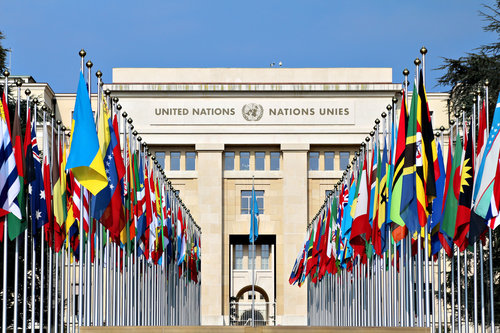Three Ways Stakeholders Hold Companies Accountable For Human Rights
January 18, 2017
Blogs Business and Human Rights
By Chloe Poynton
Since the 2011 endorsement of the Guiding Principles on Business and Human Rights (UNGPs) by the UN Human Rights Council, we have seen significant growth in the field of business and human rights. This growth has been driven by the adoption of the UNGPs by businesses, governments and civil society organizations.
Today, almost six years later, the UNGPs remain the global standard for business and human rights. However, a growing chorus of stakeholder voices are looking beyond voluntary standards for ways to expand corporate accountability for human rights impacts related to their operations, products and services. Given this, we see three different approaches to promoting greater accountability when it comes for corporate respect for human rights:
1. BINDING TREATY
Critics of the UNGPs and voluntary standards in general point to the lack of an effective enforcement mechanism and the slow pace of progress in addressing business-related human rights abuses. To counter these concerns, an Intergovernmental Working Group at the UN Human Rights Council was created to develop a binding international instrument on business and human rights. The Working Group, established in 2013 through a resolution drafted by Ecuador and South Africa and supported by 20 countries including China, Russia, and India, was welcomed by several civil society organizations.
The treaty discussions have received strong opposition from business associations and from the US, Canada, and EU countries. A primary concern is the focus on transnational corporations without also considering human rights impacts of domestic companies. In addition, there are concerns that the focus on corporate respect comes at the expense of efforts to promote the state duty to protect human rights – a sharp departure from the UNGPs.
While the development of a binding treaty is expected to be a lengthy process with the potential for consensus among member states low, the discussions informing the treaty have the ability to influence the global public policy debate on corporate accountability. In addition, while a binding treaty may seem unlikely at an international level, individual jurisdictions are increasingly legislating corporate management of human rights—including the UK Modern Slavery Act and the recent draft legislation in France which would require companies to conduct due diligence on human rights impacts related to their own operations as well as those of their subsidiaries and suppliers.
At the same time efforts to promote the UNGPs continue, which at the UN level are being led by the Working Group on Business and Human Rights as well as the Office of the UN High Commissioner for Human Rights (OHCHR). The Human Rights Council passed a resolution on business and human rights which encouraged all states to report on progress in implementing the Guiding Principles and develop National Action Plans. It also asked OHCHR to develop recommendations on how states can overcome barriers to access to judicial remedies for business-related human rights impacts.
Impact for Private Sector: Individual companies have largely been absent from discussions on the binding treaty where they’ve been represented by global associations such as the International Organization of Employers. However, business leaders are increasingly calling for strong corporate engagement on its development to ensure that private sector voices are not lost in the process. Those interested can work through industry associations and home governments to ensure private sector representation in treaty discussions that may shape future accountability mechanisms.
2. REFERENCING THE GUIDING PRINCIPLES IN LEGAL PROCEEDINGS
While considered ‘soft law,’ the UNGPs are increasingly being cited in legal proceedings. In 2013, the Ontario Superior Court of Justice referenced the UNGPs in Angelica Chov v. Hudbay Minerals, noting that the Principles support the view that a duty of care may exist in circumstances where a parent company’s subsidiary is alleged to be involved in gross human rights abuses. In addition, the South African appellate cited the UNGPs for the proposition that a garnishment law was unconstitutional because it does not adequately protect human rights as required by the ‘state duty to protect’ as outlined in the UNGPs. These cases suggest that the UNGPs are increasingly being viewed as international norms and courts will likely continue to reference them in cases of corporate human rights infringement.
Impact for the Private Sector: The increased reference of the UNGPs in legal proceedings reinforces the importance for companies to view the UNGPs as a legal compliance issue, treating them with the same level of attention as binding international laws governing their behavior.
3. RATINGS AND RANKINGS OF CORPORATE PERFORMANCE
A growing number of rankings and ratings of corporate human rights performance are being designed to spur company action to strengthen human rights management systems and demonstrate alignment with the UNGPs. High profile rankings include the upcoming multi-sector Corporate Human Rights Benchmark, supported by investors managing $4.8 trillion in assets, and KnowTheChain, which focuses on human trafficking in the supply chain. These cross-sector ratings and research initiatives are joined by industry-specific human rights rankings such as Ranking Digital Rights in the ICT sector, Oxfam’s Behind the Brands, which focuses on food and agriculture sectors, as well as Baptist World Aid’s Australian Fashion Report, which ranks apparel and footwear companies.
Impact for the Private Sector: Our clients have noted that the ratings and rankings have resulted in increased attention on human rights internally. For companies seeking to avoid low rankings, expanded investment and disclosure on human rights can improve ranked performance and drive greater accountability.
These three trends are all driving greater accountability for corporate human rights performance. While a binding treaty might be far off, companies should increasingly shift their views of the UNGPs from ‘soft law’ to ‘hard law.’ Companies who do so are likely to see reduced risk from actual and potential human rights impacts, higher ratings on corporate human rights rankings, and greater ease at meeting evolving regulations enforcing human rights.
